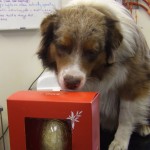More than 80% of owners say their pet is afraid of firework noises. Signs of stress in dogs include trembling, shaking, hiding behind furniture, barking excessively, and trying to run away. Cats are much better at hiding their anxiety, but symptoms may include excessive meowing, refusal to eat, hiding, or vertical scratching and spraying.
Often mild reactions to fireworks can be managed with a pheromone (scent) spray; called Feliway in cats and Adaptil in dogs. These products can be purchased from our surgeries.
More severe reactions in dogs may be managed with a combination of sound desensitisation, using CD’s such as Soundsscary, and Adaptil. Occasionally tranquilizers may be prescribed after consultation with your vet, but these are generally used as a last resort.
Further tips for reducing firework anxiety include:
i. Provide a den or hiding place; this works best if it is a place previously chosen by your pet when they have been frightened before.
ii. Plug a Feliway diffuser or Adaptil diffuser close to the den at least a few days before the fireworks start.
iii. Try to ignore behaviour such as whining and crying, panting or pacing. Pets can pick up on their owner’s anxiety, and if you try to soothe them it can reinforce the belief that fireworks are something to be afraid of. It is also important not to scold them.
iv. Close doors and windows, close curtains and turn on music or the TV to mask some of the noises.
v. Keep cats indoors and have them microchipped in case they escape.
Please contact any of our surgeries in West London for further information or a consultation. Please see www.youngvets.co.uk for contact details.





